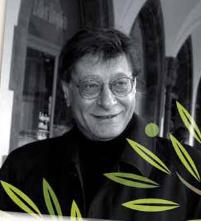Sonnets to the lilt of an oud: An evening of poetry in Melbourne
Published on 23 February, 2012
CQUniversity Melbourne Campus has arranged An Evening of Poetry Reading, celebrating the work of Mahmoud Darwish.
A selection of Darwish's poems will be read in both English and Arabic, accompanied by oud player Fouad Hraqah.

Poet Mahmoud Darwish
All are welcome to attend the event from 5.45pm (for 6pm) on Tuesday, March 13, at the campus at 108 Lonsdale Street.
Melbourne Campus senior lecturer Dr Tris Kerslake says several people will be helping with the readings.
"Several of us will be doing the readings, Dr Jonathan Sibley, Dr Ali Abusalem, myself, and a senior personage from the Palestinian Consulate in Melbourne," Tris says.
"We also have the well-known oud player (an oud is an early form of the lute), Fouad Hraqah, to enhance the mood and ambience.
"This is planned to be the first of a series of poetry recitals, where we will be celebrating some of the great ‘voices' of the world.
"The event has been discussed on SBS Radio, who are also advertising the evening, and we've attracted the attention of a number of local Arabic groups and poetry groups."
Mahmoud Darwish
Born March 13, 1941 in Al Birweh, Palestine
Died August 9, 2008 in Houston, Texas
According to http://www.mahmouddarwish.com/ Darwish is considered Palestine's most important poet and is one of the most eminent 20th century poets. Darwish published his first collection of poems, Leaves of Olives, in 1964, when he was 22. During his writing career he published approximately thirty poetry and prose collections which have been translated into more than twenty-two languages.
His awards and honours include the Ibn Sina Prize, the Lenin Peace Prize, the 1969 Lotus Prize from the Union of Afro-Asian Writers, France's Knight of Arts and Belles Lettres Medal in 1997, the 2001 Prize for Cultural Freedom from the Lannan Foundation, the Moroccan Wissam of Intellectual Merit handed to him by King Mohammad VI of Morocco, and the USSR's Stalin Peace Prize.
As a young man, Darwish faced house arrest and imprisonment for his political activism and for publicly reading his poetry. He joined the offi cial Communist Party of Israel, the Rakah, in the 1960s. In 1970, he left for Russia, where he attended the University of Moscow for one year, and then moved to Cairo. Darwish was an editor for a Palestine Liberation Organization monthly journal and the director of the group's research centre. He served as the editor-in-chief and founder of the literary review Al-Karmel, published out of the Sakakini Centre since 1997.
Darwish lived in exile for twenty-six years, between Beirut and Paris, until his return to Israel in 1996, after which he settled in Ramallah in the West Bank.
The American-Palestinian poet Naomi Shihab Nye (Chancellor of the Academy of American Poets) has said of Darwish's work, "Mahmoud Darwish is the Essential Breath of the Palestinian people, the eloquent witness of exile and belonging, exquisitely tuned singer of images that invoke, link, and shine a brilliant light into the world's whole heart. What he speaks has been embraced by readers around the world - his in an utterly necessary voice, unforgettable once discovered."
‘Mahmoud Darwish affirms an open conception of what being an Arab is. Arab, to him, is not an identity closed unto itself, but a pluralism totally open unto others. In his oeuvres, he dialogues with a group of cultures (Canaanite, Hebrew, Greek, Roman, Persian, Egyptian, Arab, French, English, Ottoman, Native American) as well as with myths of the three monotheistic religions. These dialogues create multiple layers within the poem that may be difficult to appreciate unless the reader can develop a full understanding of the ‘I's and the ‘others' of the text'

